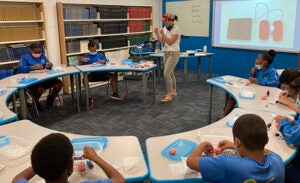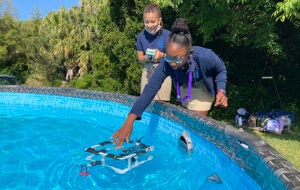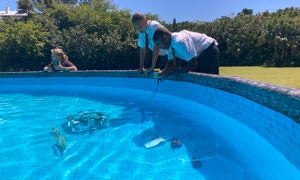Ready, Set…Robotics!

Three primary 6 (U.S. grade 5) teachers received extra support for the Bermuda Public School System’s physics curriculum when they brought their students to BIOS last month for a “Circuits and Robotics” field trip. The two-part field trip began with a classroom-based workshop, shown here with students from St. David’s Primary School, that focused on investigating circuits. Using special conductive and insulating play dough, as well as a variety of household items, students explored ways to build a circuit and learned how to classify materials as electrical conductors or insulators.
What do playdough and underwater robots have in common? Both are tools being used by BIOS’s Ocean Academy to teach students about circuits, reinforcing concepts that are part of the Primary 6 (U.S. grade 5) Physics curriculum for Bermuda’s public schools.
In mid-May, P6 classes from Somerset Primary, St. David’s Primary, and St. George’s Preparatory School took turns visiting BIOS for a “Circuits and Robotics” class. The two-part field trip was offered through the Institute’s Curriculum Enrichment Program, which aims to enhance local science, technology, engineering, and mathematics (STEM) education by connecting teachers with BIOS research.
“We enjoyed helping the P6 students extend their knowledge of circuits,” said Claire Fox, BIOS science education officer. “The two workshops added to information they learned in the classroom by letting them build and test circuits, and providing a real-world example of how they are used to power underwater robotic vehicles.”

The second part of the field trip took students outdoors to the BIOS Innovation Pool, where they learned that circuits are used to power underwater robots known as remotely operated vehicles, or ROVs. They even got to try their hands as ROV pilots, working together in teams to navigate ROVs through tasks designed to simulate real-world scientific missions. Here, students from St. George’s Preparatory School collect “sponges” for pharmaceutical research.
The first part of the field trip was a classroom-based workshop focused on electrical circuits. Using special conductive and insulating playdough from a company called Squishy Circuits, students built simple circuits with buzzers and LED lightbulbs. As a group, they discussed how some materials are good electrical conductors, while others are good electrical insulators. The students made predictions about the conductivity of various objects on their tables, which included wood, paper clips, coins, limestone, and stainless-steel screws, among other items. They then tested their predictions, placing each material in a circuit to see if the lightbulb would illuminate, indicating good conductivity.
Afterward, in a robotics workshop held outside at the BIOS Innovation Pool, students learned how circuits are used to power underwater robots known as remotely operated vehicles (or ROVs). Poolside, students teamed up in groups of two to three for an ROV challenge. Using control panels with switches, teams had to pilot their ROVs to complete various tasks, which were designed to simulate real-world scientific missions, such as collecting sponges for pharmaceutical research.

Students from Somerset Primary use an ROV to collect “marine debris,” a common issue in marine and coastal environments worldwide. Lisa Siese, the P6 teacher at Somerset Primary, said, “It was awesome to have a field trip that so expertly summarized what we covered in science earlier in the year.”
“The students thoroughly enjoyed the hands-on nature of the lessons,” said Tamara Sukdeo, P6 teacher at St. George’s Preparatory School. “It was particularly helpful that they came into the lesson with prior knowledge and were able to see how the concepts they know have practical applications.”
Lisa Siese, P6 teacher at Somerset Primary, hopes to use the workshops as a review for her students’ exams in the upcoming 2022-2023 academic year. “It was awesome to have a field trip that so expertly summarized what we covered in science earlier in the year,” she said.
